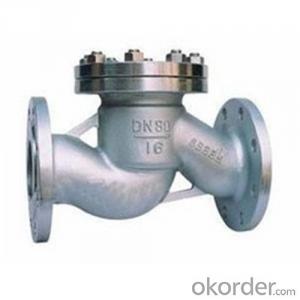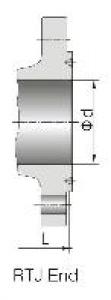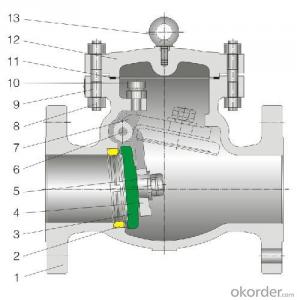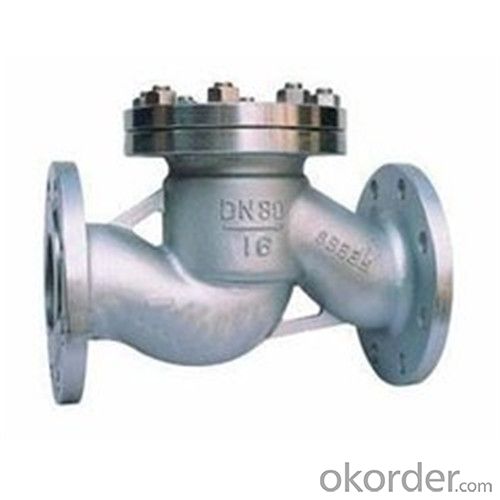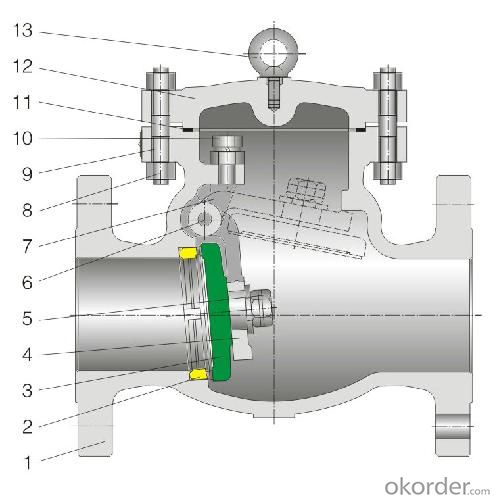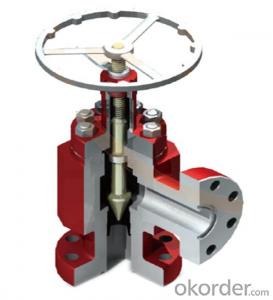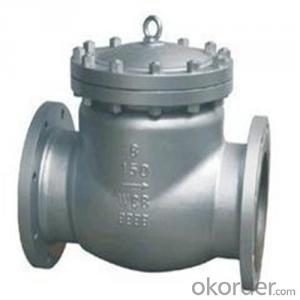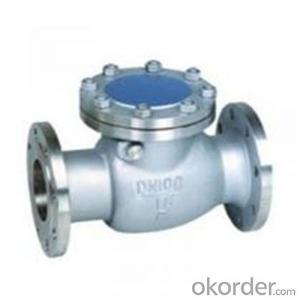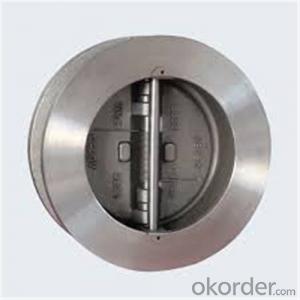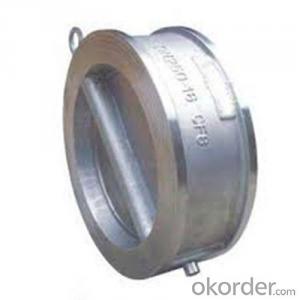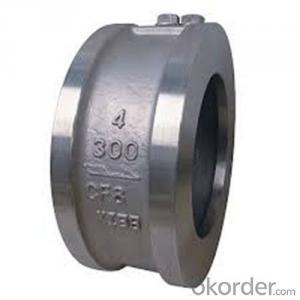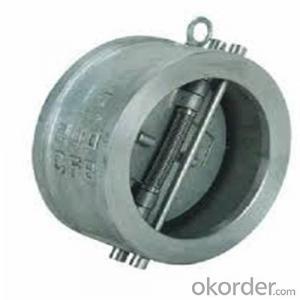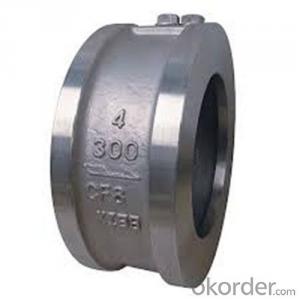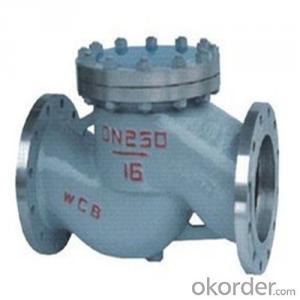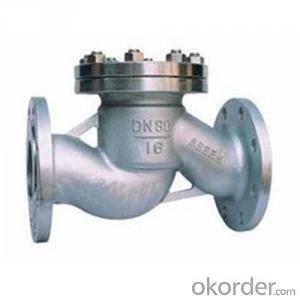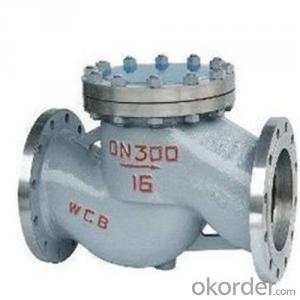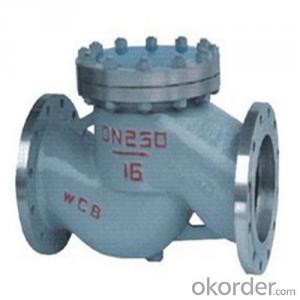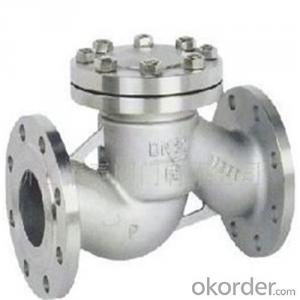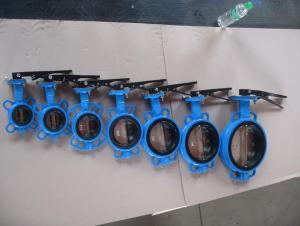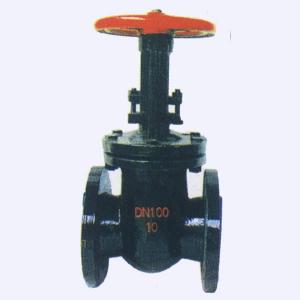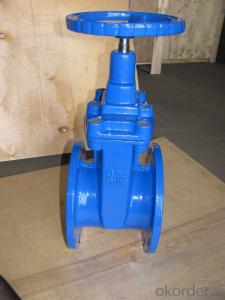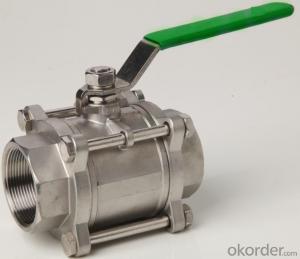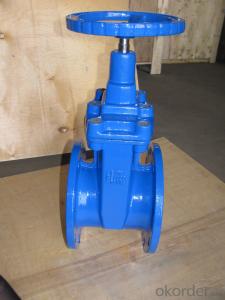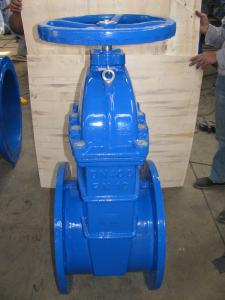API Cast Steel Lift Check Valve Size 650 mm
- Loading Port:
- Shanghai
- Payment Terms:
- TT OR LC
- Min Order Qty:
- 10 pc
- Supply Capability:
- 100 pc/month
OKorder Service Pledge
OKorder Financial Service
You Might Also Like
API Cast Steel Lift Check Valve 150 Class
The features of Cast Steel Lift Check Valve
Bolted Bonnet;Swing and lift disc;Metallic seating surfaces.
Body and Bonnet Connection of Cast Steel Lift Check Valve:
The body and bonnet of Class150~Class900 check valves are usually with studs and nuts.And the body and bonnet of Class1500~Class2500 check valves are usually of pressurized seal design.
Body-To-Bonnet Joint of Cast Steel Lift Check Valve:
Stainless steel + flesible graphite wounded gasket is used for Class 150 and Class 300 check valve;Stainless steel + flexible graphite wounded gasket is used for Class 600 check valve,and joint gasket is also optional for Class 600 check valve;Ring joint gasket is used for Class900 check valve;Pressurized seal design is used for Class 1500~Class 2500 check valves.
Seat of Cast Steel Lift Check Valve:
For carbon steel check valve,the seat is usually forged steel.The sealing surface of the seat is spray welded with hard alloy specified by the customer.Renewable threaded seat is used for NPS<10 check="" valves="" and="" welded="" on="" seat="" can="" be="" also="" optional="" if="" being="" requested="" by="" the="" customer.welded="" is="" used="" for="" nps="">12 crbon steel gate valves .Forstainless steel check valve,integral seat is usually adopted ,or to weld hard alloy directly integrally.Threaded or welded on seat is also optional for stainless steel check valve if being requested by the customer.
Parameter of Cast Steel Check Valve:
Standard Criteria | ASME/ANSI/API customize |
Pressure Rating | 150 Class 300 Class 600 Class 900 Class 1500 Class 2500 Class customize |
Valve Size | 50 mm 65 mm 80 mm 100 mm 125 mm 150 mm 200 mm 250 mm 300 mm 350 mm 400 mm 450 mm 500 mm 600 mm 650 mm 700 mm 750 mm |
2 inch 2.5 inch 3 inch 4 inch 5 inch 6 inch 8 inch 10 inch 12 inch 14 inch 16 inch 18 inch 20 inch 24 inch 26 inch 28 inch 30 inch customize | |
Actuator | Automatic customize |
Connection | Butt Welding Flange RF Flange RTJ customize |
1-Body Material | A216 WCB A351-CF8 A351-CF8M customize |
2-Seat ring | A351-CF8 A351-CF8M A105+13Cr Tool Steel+A105 customize |
3-Disc | Tool Steel+A216 WCB A351-CF8M A351-CF8 A216 WCB+13Cr customize |
4-Arm | A351-CF8 A216 WCB A351-CF8M customize |
5-Nut | A194 8M A194-8 A194 2H customize |
6-Arm pin | A182-F6a A182-F316 A182-F304 customize |
7-Yoke | A351-CF8 A351-CF8M A216 WCB customize |
8-Bonnet nut | A194 8M A194-8 A194 2H customize |
9-Bonnet bolt | A193-B8 A193-B8M A193-B7 customize |
10-Bolt | A193-B7 A193-B8 A193-B8M customize |
11-Gasket | graphite+304 graphite+316 customize |
12-Bonnet | A216 WCB A351-CF8M A351-CF8 customize |
13-Eye bolt | A181 customize |
Design Standard | API 6D BS 1868 customize |
Connection Standard | API 605 ASME B 16.25-2007 ASME B 16.47A ASME B 16.47B ASME B 16.5 MSS SP-44 customize |
Test Standard | API 598 API 6D customize |
Face to Face | ASME B 16.10 customize |
Pressure-temperature ratings | ASME B 16.34-2004 customize |
Wall thickness dimension | API 600 BS 1868 |
FAQ of Cast Steel Check Valve:
Q1:I can’t find the type of steel check valve which I need. what can I do?
The chart above only lists out some common composition of steel check valve parts.We may provide other different parts material composition according to the customer's request or the actual valve working condition.
Q2:Which certification do your products pass?
Our products are in accordance with ISO 9001、ISO 14001、API 6A、API 6D、TS CE、API607/6FA/BS6755.
- Q: What are the names of the main arteries and valves?????????REALLY NEED ANSWERS TODAY!!!!!!!!!!!
- Main arteries: Aorta (oxygenated blood from heart to body), Pulmonary Artery (DEoxygenated blood from heart to lungs). Main Valves: Tricuspid valve (separated right atrium and ventricle to ensure correct flow of blood), Bicuspid Valve( separates left atrium and ventricle), Aortic Valve( ensures blood flow from left ventricle into aorta). hey sorry only saw ur question today:P hope it helps!
- Q: is it possible to check valve to piston clearance with out taking the heads off? I want to buy a bigger camshaft for my 351 windsor stock pistons with 1970 heads. cam is 230 duration (280) and 512 lift
- The piston isn't the issue here, the issue would be the valve springs. Stock Ford small block springs will bind at .500 lift, this cam will require new springs. If you don't have adjustable rocker arms (most Fords are a postive stop or torque value) you will need an adjustable valve train also. 351s and 289s BOTH use 4 inch pistons, and you CAN'T put a 3.5 inch (351) crank in a 289!
- Q: 2003 Ford Focus SE2.0L SPI EngineAutomatic Transmission 145KPerfectly maintained since new!One of the pistons had snapped, yes the actual piston, it didn't mess up the walls, but I am hearing a LOT about these dropping valve seatsI intended to do an entire rebuild with a kit, but did it break BECAUSE of a droppedvalve seat?I don't know because I don't know what that isHelp is appreciated
- I don't know if cars really have replaceable valve seats or seats that can come loose (maybe they do with aluminum heads). But if a valve contacts a piston for whatever reason the valve and piston can sort of disappear (ie, break up). How many miles are on the car, and if it has a timing belt, did you ever replace the timing belt at the recommended miles (not normally an issue for engines with timing chain). Many engines are interference engines which means that if the timing belt breaks and pistons keep moving, a piston can hit a valve. Although, we had a regular V8 engine do that (valve and piston disappear) with a car from the late 1960's (not sure of actual cause, we replaced it with a used engine).
- Q: OK, I would like to run my shorty headers open on my Camaro, but I have two questions.1. I heard valve damage may occur because cold air gets in there. Why isn't this the case with straight pipe exhaust, doesn't the cold air travel to the valves in that case anyway?2. Right now with my headers to off road y pipe I have 2 o2 sensors to throw the check engine light off, and it has worked. If I run open headers, will they still work?
- Cold air doesn't get in to damage, but the valve needs a bit of back pressure. The valve will burn, crack or check, or the valve seat will do the same. The common damage is a small w crack on the valve face, which then leaks compression gases into the hot header resulting in erratic backfire and misfiring. The lack of back pressure can be compensated for by richer mixture, or grinding a wider seat. Get used to lapping in valves, or find some high performance sodium valves and stelite seats. You could run dumps, and only open the headers for short blasts.
- Q: This valve has flow indication embossed on their body.
- Gate valves are used primarily for isolation, usually not for flow modulation. They are usually operated fully open or fully closed. Installing the valve with the arrow pointing in the direction of flow will have more to do with the tight sealing of the closed valve than with the operation when open. If the valve is to be installed in a pipeline where the flow is in either direction, pick the direction most important for good sealing. However, I do not recall seeing a flow arrow on a conventional gate valve.
- Q: primary function of a valve position?
- ...to control flow.
- Q: I was diagnosed with a VSD and a Biscuspid Aortic Valve and my doctor has started hinting towards sugery. I found out that the only reason i haven't had surgery yet is that it is stable enough to wait until technology improves so i am not left with a large scar. i was just wondering what this surgery would entail and if anyone has had it. I am 19 years old and kind of worried about it...
- VSD or ventricular septal defect is a congenital disease caused by failure of your ventricular septum to fuse with the bulbar ridges of your atrial septum during embryogenesis. Some VSD are fine since only a small amount of blood is shunted from LV to RV but a majority is still shunted straight to the aorta. An aortic valve stenosis which I think is what you are referring to is usually an adult disease associated with rheumatic fever, mechanical breakdown from hypertension, or death from an MI. Aortic valve stenosis is a bit more worrisome since this can lower the output of your heart by acting as an obstruction, which overtime can cause ventricular hypertrophy, a disease with whole set of other problems. New trends in VSD repair uses minimally-invasive surgery using a transcatheter that is inserted esophageally or through femoral artery; very small scars and short recovery time. Aortic valve repair may also be done this way in the future, but if your aortic valve is still patent, there is no need to replace it at this moment because it would require a donor and open heart surgery.
- Q: how hard is it to clean the egr valve on my 2002 Chevy Malibu? if you can give step by step or possibly a website/YouTube video link. thanks
- Cleaning it could make it worse then your experiencing now, but if you want to here's the steps. There are two bolts holding the EGR val;ve down. Remove them, and use a can of carb cleaner to clean the carbon out of the two ports that are in the valve. Reinstall with a new gasket and run the car. If the check engine light comes on replace it. I recently got a EGR valve (not recommended but they work) from a local wrecking yard for my folks '99 Venture 3.4 ltr motor, replaced the one on the van because it was throwing the EGR code and it worked fine. No more check engine light.
- Q: Defects in which valves would produce the following?1) SEVERE DEPENDENT EDEMA?2) PAROXYSMAL NOCTURNAL DYSPEA3) CONGESTED LIVER?4) DISTENDED JUGULAR VEINS?5) PRODUCTIVE COUGH WITH FROTHY SPUTUMfor 1. i believe it's tricupsid valve, 2. mitra valve please correct me if I'm wrong. Thaanks!
- 1. Would require dysfunction on a valve in the right heart generally speaking, so the options would be the likes of tricuspid regurgitation or stenosis, or even pulmonary stenosis. 2. PND is a result of heart failure, particularly regarding the left side of the heart (although of course both sides could be failing). Many valve problems could cause this as an end result... a bit of an odd question, but I'd go with mitral stenosis or regurgitation primarily. 3. Congested liver is the systemic blood system overload (like the oedema), so it is the right heart. Triscuspid regurgitation can cause a congested liver and if you felt this liver, it would be pulsating too. 4. Distended jugular veins are a sign of heart failure. Primarily right heart failure as it is causing blood to be backed up instead of passing through the right heart to the lungs. Tricuspid stenosis or plain old right heart failure (with or without left heart failure at the same time). 5. This is typical of left heart failure as blood backs up into the pulmonary system as the left heart is failing to pump into the systemic circulation. Similar things to PND can cause this. These questions though, are honestly a little on the vague side and half those cases would result from heart failure even without any valvular abnormalities...
- Q: I bought the valve but i have been all over and nobody has a tube that matches mine they all say they have it in stock but once we get there they say it doesnt match. Even online i cant find one that matches. What do i do?
- Can you give a little more info, like what is the year/model, and what is the tube you are speaking of? Are you looking for the heater hose?
Send your message to us
API Cast Steel Lift Check Valve Size 650 mm
- Loading Port:
- Shanghai
- Payment Terms:
- TT OR LC
- Min Order Qty:
- 10 pc
- Supply Capability:
- 100 pc/month
OKorder Service Pledge
OKorder Financial Service
Similar products
Hot products
Hot Searches
Related keywords
